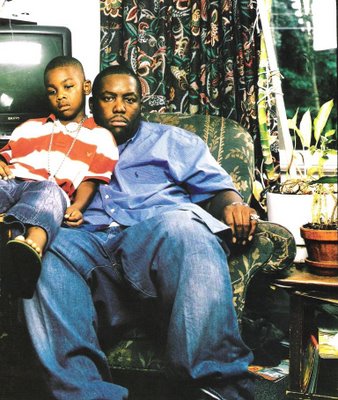Killer Mike: Think Bigger
An interview with rap artist Killer Mike was featured in this month's issue of MassAppeal and even though I know less than zip about the guy as an artist, I was really impressed by his thoughtful responses to questions the interviewer put to him.
^^Not sure if the little fella with Mike is his son or not but the image was taken by Shane Nash
In particular, I liked his response to a question on Kanye West:
Question: You mentioned earlier that rap lacks leadership. Were Kanye West's Katrina comment more powerful than his campaign to stop rappers from calling each other gay (no homo)?
Mike: I think Kanye's comments on Katrina was a sexy thing to say. George Bush don't like black people? George Bush don't like poor people! Well, he likes his poor Mexican gardener, his poor Cuban restaurant worker, his poor nigger slaves in the penal system working for pennies on the dollar. But Kanye is not going to say "poor" because Kanye wears couture Ralph Lauren suits. The minute Dr. King walk up and say, "This isn't about race, this about po-" Pop! Pop! Pop! He was laying there dead before "poverty" even got out of his mouth, because what your'e doing there is fucking up a system of institutionalized servitude. When you start talking about issues of poverty, you go beyond race.Kanye polarized a whole community of poor whites that got killed in Alabama, the Gulf Coast and Mississippi."
I'll be the first to admit that I was thrilled when Kanye took down the president with his comments, but the fact is, we have an underclass in this country and it's not necessarily just black. In fact, Kanye's statement feeds into the societal assumption that all black people are poor. As Mike points out, Kanye is doing pretty well for himself as are many other black people.
That's not to say either that we can reduce everything to income levels. Race absolutely does factor in. Which brings me back to a post I did the other day on New York magazine's weekly column called the "Approval Matrix."
After I posted it, Adam Sternbergh, the editor of the column, was nice enough to write me to discuss some of the points I made about what appears to be a color bias in the Matrix. You'll have to read the original post to understand what I'm talking about, but my biggest beef was that people of color were almost always positioned in the column as Lowbrow.
His main point about the Matrix was as follows:
"The main point, though, is that there's nothing pejorative, in our minds, about lowbrow vs. highbrow. There's an old, outdated definition of "lowbrow" that suggests it's a put-down. We don't feel that way at all. Instead, the difference to our minds is that highbrow suggests pretension and ambition, while lowbrow suggests a more direct relationship to pleasure: things that don't present themselves as good for you, just good. Like rock,or rap, or comic books, or sitcoms: the kinds of things that often get described as "guilty pleasures," though we don't feel at all guilty aboutfinding them pleasurable."
He added that Diddy always goes in Lowbrow because no one would consider what he does "capital A art."
I could appreciate his perspective, but when I responded to him, I pointed out that because of his own background, there were probably class and race issues at play that he was blind to. For example, when you read the Matrix, it's clear that he embraces the conceit that when it comes to matters of taste, it's the middle class and educated who set the standard. Now granted, in order for the column to exist, there has to be some standard and given New York's audience, this one makes sense.
However, one of the pitfalls of this standard is that it reflects some racist/classist outlooks that are part and parcel of the middle class and educated. So while he may see Jay-Z as nothing more or less than a rap artist, others, rightfully so, see an accomplished CEO who not only heads up a major corporation, but also has more than a few musical genius moments to his credit.
I think it'd be interesting to see how the Approval Matrix would appear in a magazine, like, say, "Don Diva," magazine, the "original street bible." Would Lil' Kim, a self-made woman who is more or less rap royalty be considered Highbrow? Would a multi-millionaire like "Failure," aka George Bush, who inherited all his wealth, and pretty much drove any institution he was in charge of--including the United States--into the ground, be considered Lowbrow? It'd be interesting to find out, wouldn't it?
No comments:
Post a Comment